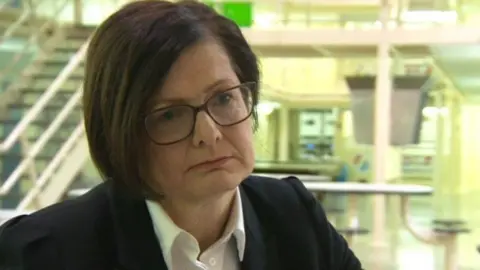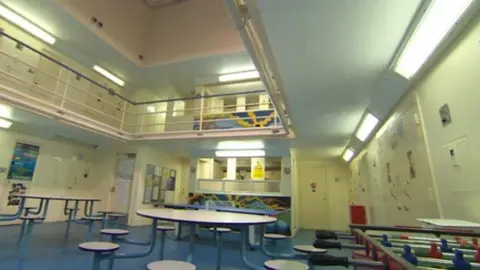Parc Young Offenders Institution 'best in England and Wales'
A young offenders institution near Bridgend is "easily the best performing" in England and Wales, the chief inspector of prisons has said.
In an unusually positive report, Peter Clarke praised the amount of activities provided for 15 to 18-year-olds in Parc.
But its governor said they struggled to get mental health services for inmates from the local health board.
Cwm Taf Morgannwg health board said it continued to review the service needed.
Overall the annual inspection of Parc Young Offenders Institution reported "overwhelmingly positive findings", with care and purposeful activity given the top rating of "good", and safety and resettlement deemed "reasonably good". Mr Clarke said any negative findings should not detract from the good work being done.

However he found mental health services were not in line with national standards.
Governor Janet Wallsgrove said mental health services needed a lot more support and funding as they were an "opportunity to prevent people committing crime" on release.
Dealing with violent young people
A majority of the boys there have been convicted of murder, manslaughter, high-end violent offences, grievous bodily harm with intent and are "doing very long terms", according to Jason Evans, who manages the young person's unit.
"It's not unusual these days for a person under 18 to be doing 20-plus years - that was unheard of probably 10 years ago," he said.
"So you're taking that top 2% in the country of the most violent young people we have... co-located with other boys with similar traits.
"Gang culture outside - belonging - is a real big thing for these boys so we try to show them there's a different way to belong."
The report also found:
- Assaults on staff had fallen by 38%
- Use of force had increased by 17%
- Assaults on children were down 15% and lower than similar prisons
- Fights between children had risen 92% and were more frequent than similar prisons.

Most children spend more than 10 hours out of their cell every day.
Mr Evans explained the activities offered helped the boys learn how to work with others, but there were inevitable risks, such as an increase in conflict.
"The more time people spend together [the more] that can create some conflict and in custody violence can be an issue - it is an issue for us in Parc - but we take a view the only way we can reach people is to work with them."
'Too much to lose'
Just under a third of the young inmates are from Wales. Seventeen-year-old "Callum" has been at Parc for a few months and is due out later this year.
He did not do "well" on the outside, but he has now achieved qualifications including a maths GCSE.
"In carpentry... I made a plaque for my nan and grandad. Now I'm in the middle of making some woodwork for my dad and his girlfriend," he said.
"I'm happy with myself and [it made me feel] emotional really, knowing they liked it and it took me a lot of time to make...
"I've too much to lose than come here again."
As for the other boys, he said: "If you're nice to them they'll be nice to you, respect them - they respect you."

Cwm Taf Morgannwg University Health Board said the health needs of those in prison were complex.
"A new mental health pathway was introduced in 2018, with a referral system to assist with prioritising those most in need," a spokeswoman said.
A Welsh Government spokesman said health boards continued to work with the prison service in Wales to improve health and wellbeing in prisons.
The prison service said the first meeting of a joint board with Public Health Wales and local health boards, set up to discuss any issues, was taking place this month.


In recent years, there's been a big shift to keep children out of the criminal justice system - to focus on solving their problems rather than punishing them for the consequences.
That means fewer are locked up, but those who are have committed a serious crime.
While other young offenders institutions try to combat gang culture by separating boys or keeping them in their cells, at Parc all 39 young people were out of their rooms during the school day, the chief inspector observed.
That was "almost the complete opposite" of what he had seen elsewhere.
The result is an almost inevitable increase in fights - inevitable because many of these boys have grown up surrounded by violence.
By working with them, getting to know them, building their skills and confidence - and also aiming to instil routine, discipline and a sense of self-worth - staff at Parc are starting to see results.
Serious assaults on staff and children remain low - arguably because the use of force nips it in the bud.
The question is whether any of this can result in lifelong changes for these young people.
When so many things are out of the prison's control - including access to mental health services or resettling children who are hundreds of miles from home - that will remain a challenge.
